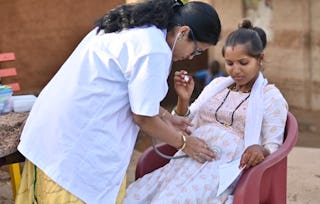This course will review challenges for maternal and newborn health in the developing world, where a great many women and babies are suffering from complications during pregnancy, childbirth, and the days following birth. Themes covered include the epidemiology of maternal and newborn mortality and morbidity, relevant issues for the global health workforce, community-based interventions to improve maternal and newborn health and survival, and sociocultural dynamics surrounding birth.

Childbirth: A Global Perspective

89 reviews
Skills you'll gain
Details to know

Add to your LinkedIn profile
See how employees at top companies are mastering in-demand skills

There are 6 modules in this course
Welcome to Module 1! This course will discuss the global health implications of pregnancy and childbirth in the developing world, where far too many women and babies die from complications during pregnancy, childbirth, and soon after childbirth. Themes covered in this module include an introduction to maternal care, an in-depth look at the numbers, and a look at maternal mortality and morbidity in a global context.
What's included
5 videos3 readings1 assignment
In this module you’ll visit the United States where, believe it or not, maternal mortality rate is actually on the rise! In fact, maternal mortality has doubled in the U.S. during the last two decades. Why is that? And what can be done to reverse this trend? Along the way you’ll meet a physician and her patient who will help us answer some of these questions.
What's included
7 videos1 reading1 assignment
In this module we’ll be discussing the critical importance of having an adequate and well-trained health workforce for reducing maternal and newborn morbidity and mortality. We’ll be discussing the problems of shortage and maldistribution, as well as some important strategies for addressing these problems such as task shifting and task sharing.
What's included
6 videos1 reading1 assignment
In this module, we will learn about a globally recognized package of such interventions called emergency obstetric care, or EmOC. We will spend some time learning about how emergency obstetric care is assessed and monitored at the national and sub-national levels, including quality improvement measures. Lastly, we will consider some key challenges and potential solutions in developing country contexts.
What's included
6 videos1 reading1 assignment
This module will take a new turn - how ordinary citizens can be mobilized to effectively take action to improve health for mothers and babies. You will learn about participatory learning and action. You will learn what research studies have to say about the effectiveness of this kind of approach. Also, you will get a chance to see specific examples of the outcomes of community mobilization in two settings, one in Atlanta, Georgia in the U.S., and one in the Caribbean country on the island of Hispaniola, the Dominican Republic.
What's included
6 videos1 reading1 assignment
Welcome to the last module! In this module, you will receive an overview of the Maternal and Newborn Health in Ethiopia Partnership (referred to as MaNHEP). Also, you will learn about the Ethiopian context regarding maternal health; the overall goal of the MaNHEP project and its key partners and supports; where the project was situated within Ethiopia; the assumptions that serve as the basis for the project’s intervention; the project evaluation; and a summary of results. Finally, we will take a step back to examine the strengths of the project and its potential for scale-up and possible application elsewhere.
What's included
7 videos1 reading1 peer review
Instructor

Offered by
Explore more from Public Health
 Status: Preview
Status: PreviewYale University
 Status: Preview
Status: PreviewJohns Hopkins University
 Status: Preview
Status: PreviewUniversity of Michigan
 Status: Free Trial
Status: Free TrialJohns Hopkins University
Why people choose Coursera for their career

Felipe M.

Jennifer J.

Larry W.

Chaitanya A.
Learner reviews
- 5 stars
74.15%
- 4 stars
20.22%
- 3 stars
5.61%
- 2 stars
0%
- 1 star
0%
Showing 3 of 89
Reviewed on Jan 31, 2022
Good course. Great content, but even though I finished all assignments (review and have been reviewed for my final essay), I must wait 6 weeks from starting the course in order for me to"finish" it.
Reviewed on Apr 6, 2018
I like it childbirth global perspective from coursera. App
Reviewed on Oct 29, 2020
This course were very useful for midwifery practice by authentical information and helpful teachers.

Open new doors with Coursera Plus
Unlimited access to 10,000+ world-class courses, hands-on projects, and job-ready certificate programs - all included in your subscription
Advance your career with an online degree
Earn a degree from world-class universities - 100% online
Join over 3,400 global companies that choose Coursera for Business
Upskill your employees to excel in the digital economy
Frequently asked questions
To access the course materials, assignments and to earn a Certificate, you will need to purchase the Certificate experience when you enroll in a course. You can try a Free Trial instead, or apply for Financial Aid. The course may offer 'Full Course, No Certificate' instead. This option lets you see all course materials, submit required assessments, and get a final grade. This also means that you will not be able to purchase a Certificate experience.
When you purchase a Certificate you get access to all course materials, including graded assignments. Upon completing the course, your electronic Certificate will be added to your Accomplishments page - from there, you can print your Certificate or add it to your LinkedIn profile.
Yes. In select learning programs, you can apply for financial aid or a scholarship if you can’t afford the enrollment fee. If fin aid or scholarship is available for your learning program selection, you’ll find a link to apply on the description page.
More questions
Financial aid available,
¹ Some assignments in this course are AI-graded. For these assignments, your data will be used in accordance with Coursera's Privacy Notice.

